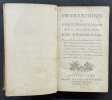5 books for « eller johann theodor »Edit
-
Topics
Chemistry (3)
Medicine (2)
-
Countries
Denmark (4)
France (1)
Observationes de cognoscendis et curandis morbis, praesertim acutis. Joan Theodori Eller
Amstelodami, Sumptibus Fratrum Detournes, M. DCC. LXVI. 1761 In-8 20 x 12 cm. Reliure de l’époque veau marbré havane, dos lisse orné de fers dorés, XII-307 pp.
Texte en latin. Johann Eller (1689-1760) était directeur de la Charité de Berlin et médecin personnel de Frédéric le Grand. Bon état d’occasion
Dissertation sur les Elemens ou Premiers Principes des Corps. (2 Parts).
(Berlin, Ambroise Haude, 1748). 4to. No wrappers, as issued in ""Mémoires de l'Academie des Sciences et Belles Lettres"", tome II, pp. 3-48.
First edition. ""Eller's influence on chemical theory has never been considered of great importence, yet it is known that Lavoisier read Eller's papers, especially those dealing with the elements, and his early views have an interesting resemblance to Eller's ideas about heat and fluidity."" (DSB).
Ausübende Arzneywissenschaft, oder praktische Anweisung zu der gründlichen Erkenntniss und Cur aller innerlichen Krankheiten des menschlichen Körpers.
Berlin und Stralsund, Gottlieb August Lange, 1767. 8vo. Cont. full sprinckled calf. Spine worn and with some loss of leather at lower compartment. Engraved portrait. (14),784,(29) pp. Internally fine and clean.
Scarce first edition. Eller held the highest positions in Prussia, professor of anatomy, dean to the Collegium Medico-Chirurgicum, director of the Berlin Academy of Sciences and physician-in-ordinary to Frederick the Great. Together with Georg Ernst Stahl he was responsible for laying the foundation for all subsequent developments in medical services in Prussia. - Not in Waller and Wellcome.
Essai sur L'origine et la Generation des Metaux.
(Berlin, Haude et Spener, 1749). 4to. No wrappers, as issued in ""Memoires de L'Academie Royale des Sciences et Belles Lettres"" tome IX, pp. 1-50.
First printing of Elle's small history of chemistry, in which he gives an historical review of chemical theories from the Greek period, with special emphasis on the viewa of Becher and Stahl and the theory of phlogiston. Eller held the highest positions in Prussia, professor of anatomy, dean to the Collegium Medico-Chirurgicum, director of the Berlin Academy of Sciences and physician-in-ordinary to Frederick the Great. Together with Georg Ernst Stahl he was responsible for laying the foundation for all subsequent developments in medical services in Prussia. (Partington II:pp. 716-17).
Sur la Nature et les Proprietés de L'Eau. (+) Sur les Phenomenes qui se manifestent, lorsqu'on dissout toutes sortes de Sels dans L'Eau commune separément. (2 papers).
(Berlin, Haude et Spener, 1752). 4to. No wrappers, as issued in ""Memoires de L'Academie Royale des Sciences et Belles Lettres"" tome VI (1750), pp. 67-82 and pp. 83-97 and with the section-titlepage ""Memoires ....Classe de Philosophie Experimentale"".
First printing of Eller's most importent chemical works.""A really importent investigation is Eller's on the soluability of salts in water. He found that most salts cause a fall in temperature when dissolved in water, but some...cause a rise in temperature....He discusses the theory of solution - the interpostion of salt particles between water particles, attraction, etc...""(Partington II, pp. 716-17).When Frederick the Great became king in 1740, he made Eller his personal physician and appointed him director of the Berlin Academy of Sciences. Eller’s wife died in 1751, and in 1753 he married Henrietta Catherine Rosen. In 1755 Frederick made Eller a privy councillor, a position he held until his death. Eller held the highest positions in Prussia, professor of anatomy, dean to the Collegium Medico-Chirurgicum, director of the Berlin Academy of Sciences and physician-in-ordinary to Frederick the Great. Together with Georg Ernst Stahl he was responsible for laying the foundation for all subsequent developments in medical services in Prussia.
 Write to the booksellers
Write to the booksellers




